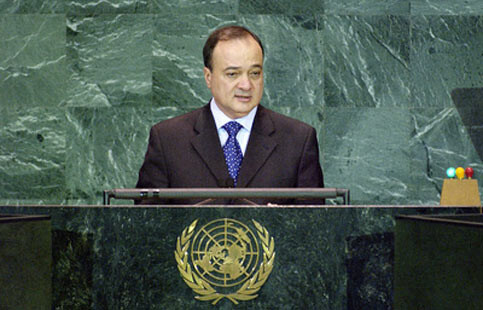United Nations Department of Public Information 9 November 2005

Palestinian Minister of Foreign Affairs, Nasser Kidwa, speaking at the General Assembly. (UN Photo)
As the Committee continued its debate on the Special Committee’s work, Israel’s delegate reacted to that body’s report by saying every year, it submitted draft resolutions and reports that were discussed at great length in the Fourth Committee, and every year, the Israeli delegation drew attention to such waste and redundancy for a United Nations budget that was woefully overtaxed. “The only effect of this absurd, indeed shameful, waste of resources is to further undermine the credibility of the United Nations as a relevant, serious and balanced player in the global arena.”
Citing recent Israeli “practices”, he said his country had withdrawn its military forces from the Gaza Strip and large parts of the Samaria, and evacuated 24 Jewish communities amounting to more than 8,000 people. Improvements to the Karni border crossing between Gaza and Israel had resulted in quicker exportation of Palestinian products and reduced unemployment in Gaza. Israel had brought the total number of roadblocks and checkpoints down from 600 to around 370, the result of a decrease in terrorism inside its borders.
He said that during 2004, Palestinians living in Gaza and the West Bank received annual per capita support of $345, compared with refugees elsewhere in the world who had to make do with a per capita allotment of $118. Why was the Committee called upon to mandate an “investigation” of one side only, as no one could contend that the Palestinian Authority was innocent of numerous human rights violations? Many would agree that the Special Committee’s work did not serve the agenda, or agreed priorities, of the United Nations as a member of the Quartet. “We must not shy away from putting an end to this futile waste of UN resources,” he added.
Other speakers, however, called attention to the deteriorating human rights situation and living conditions of Palestinians in the occupied territories, noting that since the Special Committee’s establishment, Israel had refused to cooperate with it, and urging that country’s Government to grant it access to the occupied territories.
Speakers said that although Israel’s unilateral withdrawal from the Gaza Strip and parts of the West Bank had raised hope and was a step in the right direction, that hope had been dashed by continued Israeli attacks on civilians in Gaza and other policies that constituted collective punishment. Most speakers mentioned the continuing construction of the Separation Wall on Palestinian territory, particularly in and around Jerusalem, which was contrary to the 2004 Advisory Opinion of the International Court of Justice and the 2004 General Assembly resolution ES-10/15.
The observer for the Organization of the Islamic Conference said it was clear that the real objective of Israel’s unilateral disengagement from Gaza was to divert attention away from the deteriorating human rights conditions and to create for itself favourable facts on the ground, including in East Jerusalem. Israel’s expansion of illegal settlements in the West Bank had been a primary consideration for the route of many sections of the “Apartheid Wall” and it was also implementing a “road apartheid”, which would result in the imprisonment of thousands of Palestinian.
Namibia’s representative said that Israel’s unilateral withdrawal from Gaza was not in conformity with the Road Map, which presented the two-State solution as the only realistic and viable one. Measures taken by Israel were aimed at changing the physical character, demographic composition and institutional status of the Palestinian territories, in flagrant violation of the Fourth Geneva Convention, and constituting a serious impediment to the achievement of a comprehensive, just and lasting peace in the Middle East.
Morocco’s delegate said the approach to the Israeli-Palestinian conflict should focus on establishing two independent States living side by side in peace and security. It was impossible to reach a just settlement without establishing a Palestinian State, ending the expansion of settlements and desisting from changing the character of East Jerusalem. Furthermore, the expansion of settlements in the occupied Syrian Golan and the continuing policy of detention caused a further deterioration of the social, educational and health situation there. Moreover, the burial of nuclear waste in the Syrian Golan was a grave threat to the environment.
Libya’s representative found it strange that some were trying to equate the wolf and the lamb when saying that the two parties to the conflict were responsible for the deteriorating situation and calling on both sides to show restraint. The Israeli authorities had been working to change the character of Jerusalem by forcing Palestinian residents to migrate.
Other speakers today included the representatives of Algeria, Iran, Senegal, Lebanon, United Kingdom (on behalf of the European Union), Democratic People’s Republic of Korea, Yemen and Pakistan.
Speaking in exercise of the right of reply was the observer for Palestine.
The Fourth Committee will meet again at 10 a.m. on Thursday, 10 November, to take action on outstanding draft texts.
Background
The Fourth Committee (Special Political and Decolonization) met this morning to continue its general debate on the Report of the Special Committee to Investigate Israeli Practices Affecting the Human Rights of the Palestinian People and Other Arabs of the Occupied Territories (document A/60/380). A summary of that and other relevant reports can be found in Press Release GA/SPD/333 of 7 November.
Related Links